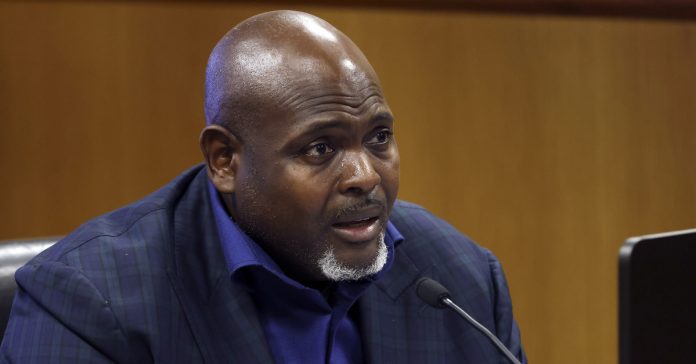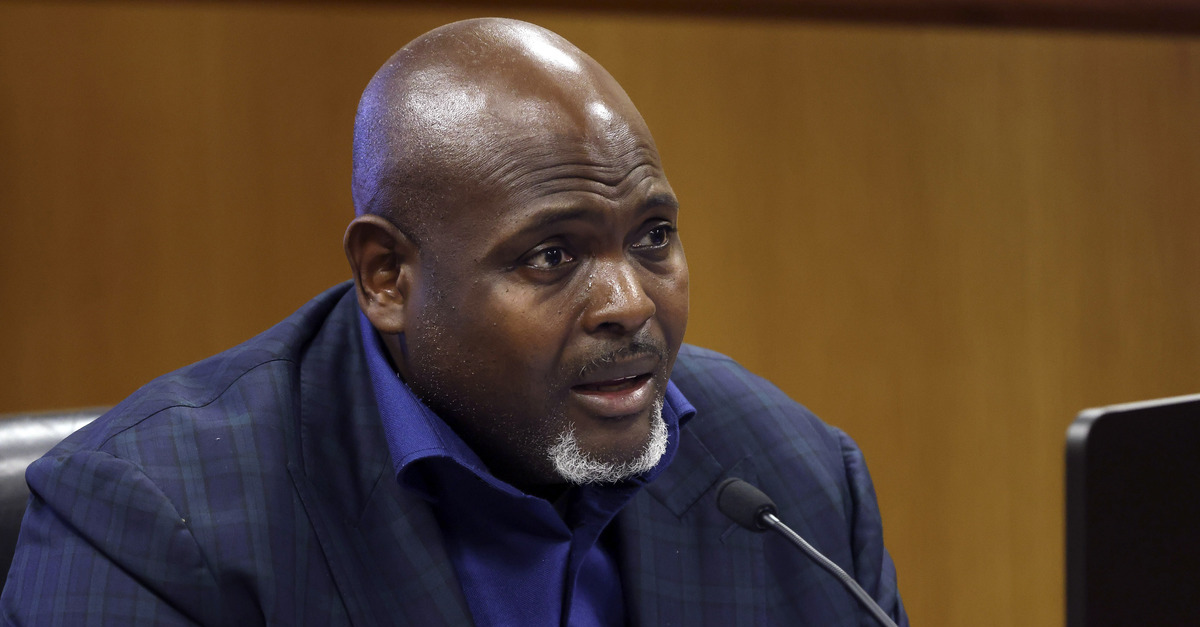
Terrence Bradley, Nathan Wade’s former business partner, testifies during a hearing on the Georgia election interference case, Friday, Feb. 16, 2024, in Atlanta. (Alyssa Pointer/Pool Photo via AP)
A Fulton County hearing was reconvened on Friday afternoon with the long-awaited testimony from the Georgia attorney previously described as the “star witness” in the defense effort to disqualify the embattled district attorney and special prosecutor overseeing the racketeering (RICO) and election subversion case against Donald Trump.
Nov. 1, 2021, is the key date in the little tempest threatening to derail the biggest criminal case in Peach State history. That’s the day Fulton County District Attorney Fani Willis hired former Judge Nathan Wade to take the reins of the investigation that led to the indictment of the 45th president and 18 other alleged co-conspirators.
The attorney-client privilege took center stage during a lengthy series of questions posed to divorce attorney Terrence Bradley, Wade’s friend and former law partner. That privilege, repeatedly invoked by the state and Bradley’s own counsel, obscured most of the specifics but offered strong hints. Those hints, however, cannot be relied upon when the court makes its ultimate determination.
That invocation of privilege, however, was wholly called into question by the judge overseeing the case after a late-stage move by the state.
The hearing established Bradley appears to have, at the very least, made statements to defense attorney Ashleigh Merchant that led her to genuinely believe Wade began a romantic relationship with Willis well before she hired him to work at the Fulton County DA’s office.
For most of his time on the stand, the formal and legal upshot of Bradley’s testimony appeared uncertain at best. Numerous questions posed by Merchant, who represents Michael Roman, a former staffer for Trump’s 2020 election campaign, were parried by Bradley and his counsel by invoking the attorney-client privilege. Various prosecutors also raised privilege objections that were sustained by Fulton County Superior Court Judge Scott McAfee.
Bradley, who has previously reflected his unhappiness with being compelled to testify under the Roman-Merchant subpoena, angrily glared at the attorney who forced his testimony throughout the day.
But that relatively minor ire appeared to be transmogrified into something like wounded astonishment when Fulton County special prosecutor Anna Green Cross, on cross-examination, accused Bradley of committing two sexual assaults — after hours worth of testimony in which his interests and answers had been all but entirely allied with the state’s.
Early on, Bradley and the prosecution looked like allies.
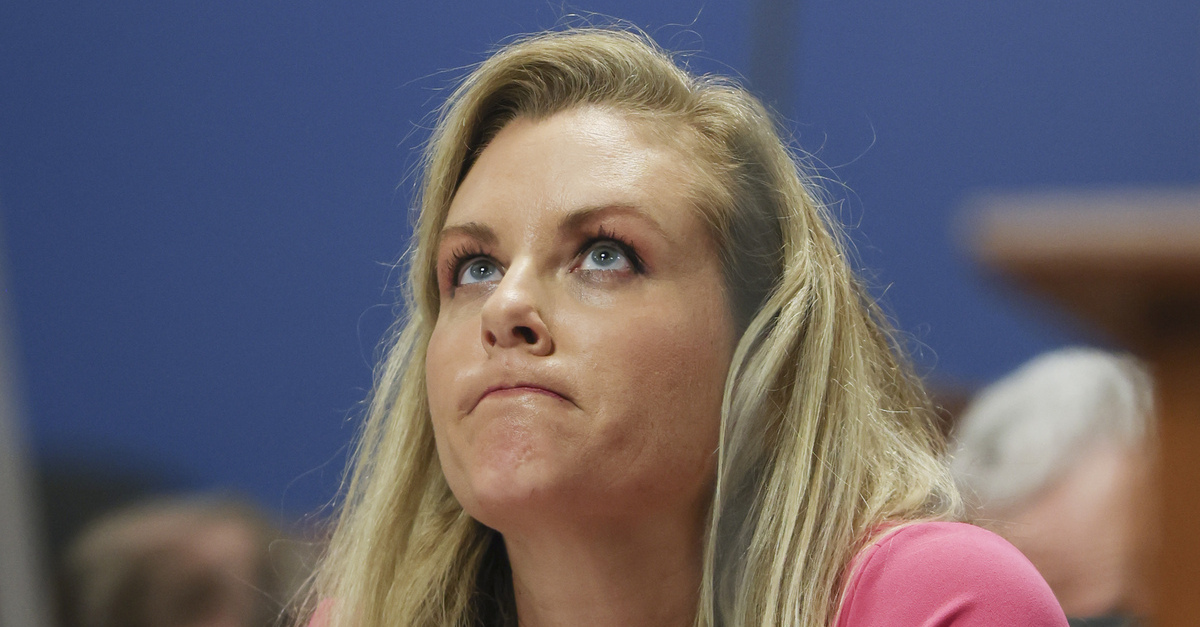
Ashleigh Merchant, attorney for Michael Roman, reacts during a hearing in the case of State of Georgia v. Donald John Trump at the Fulton County Courthouse in Atlanta, Feb. 12, 2024. (Alyssa Pointer/Pool Photo via AP)
When Merchant asked about a text message exchange between herself and the witness, Cross objected “to the question even being asked” and characterized it as “inflammatory as to even say out loud.”
After some discussion, Merchant was allowed to question Bradley about the exchange in which she asked Wade’s former partner if he knew anyone who could provide an affidavit about the affair.
“No, no one would freely burn that bridge,” Bradley texted Merchant back, the witness confirmed.
Merchant also referred to another text message exchange where she asked Bradley if the Willis-Wade romantic relationship began when they were both magistrate court judges.
“No, it was in municipal court,” Bradley texted back, he again confirmed.
Echoing objections from the state and Bradley’s lawyer kept Merchant from delving further into what Bradley texted about — particularly how Bradley came to know about the relationship. And, perhaps more importantly, when he came to know about the relationship.
“I have no personal knowledge of when it actually happened,” Bradley said, adding that anything he learned was in the service of providing legal advice and invoking the attorney-client privilege.
Merchant leveled several additional and different inquiries with Bradley beyond those text messages of unclear legal import — with the judge occasionally urging the defense attorney to make her point.
Donald Trump’s Atlanta-based defense attorney, Steve Sadow sewed the seeds that later led to the blockbuster potential shake-up.
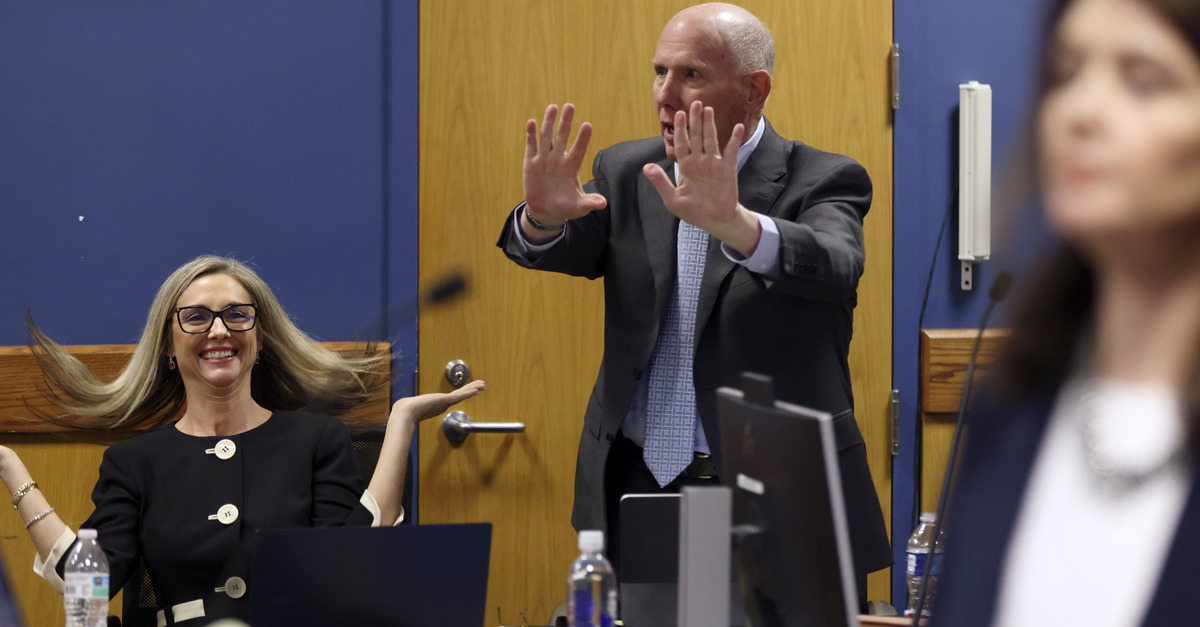
Attorney Jennifer Little and her co-counsel Steve Sadow, representing former President Donald Trump react to a question brought up by attorney Anna Cross, who is representing the Fulton County District attorney’s office, during a cross-examination of witness Terrence Bradley in a hearing on the Georgia election interference case, Friday, Feb. 16, 2024, in Atlanta. (Alyssa Pointer/Pool Photo via AP)
Well before that, as the state and the unhappy witness repeatedly shut down Sadow’s questions, prosecutors and Bradley’s attorney once again evoked the image of teamwork in batting away question after question related to Bradley’s knowledge of the affair — by lodging objection after objection sustained by the judge.
It seemed the most Sadow would get from Bradley was his response to an email praising Merchant’s work. In that email to Bradley, Merchant attached a copy of the motion to disqualify Wade and Willis. And, Bradley testified, he replied in a text message: “Looks good.”
Then, near the end of his own lengthy examination of the witness, Trump’s attorney asked Bradley about the circumstances in which he and Wade stopped working together as law firm partners.
Bradley testified their informal partnership was dissolved due, in part, to a disagreement over Wade’s divorce case — while also maintaining those details were covered by attorney-client privilege.
Then came the cross-examination.
The state elicited testimony that Bradley had, in fact, left the law firm under a cloud of two allegations of sexual assault. Bradley confirmed one of those allegations; said he had no knowledge of the other alleged victim or incident; and strongly denied that any actual sexual assault had ever taken place.
The shocking series of questions, Cross said, were in service of establishing that Bradley was biased against Wade, were relevant to exploring his motive, and called into question his credibility.
Multiple defense attorneys seized the opportunity to argue the state opened the door to several new avenues of inquiry. The judge himself said the colloquy suggested the attorney-client privilege might not now apply to several prior questions asked of Bradley.
“We’ve opened up a whole area — what he’s just responded to — he previously said was privileged,” McAfee said — anticipating some likely defense arguments. “That doesn’t sound like privilege to me. We’ll have to address that when we go back through the rundown.”
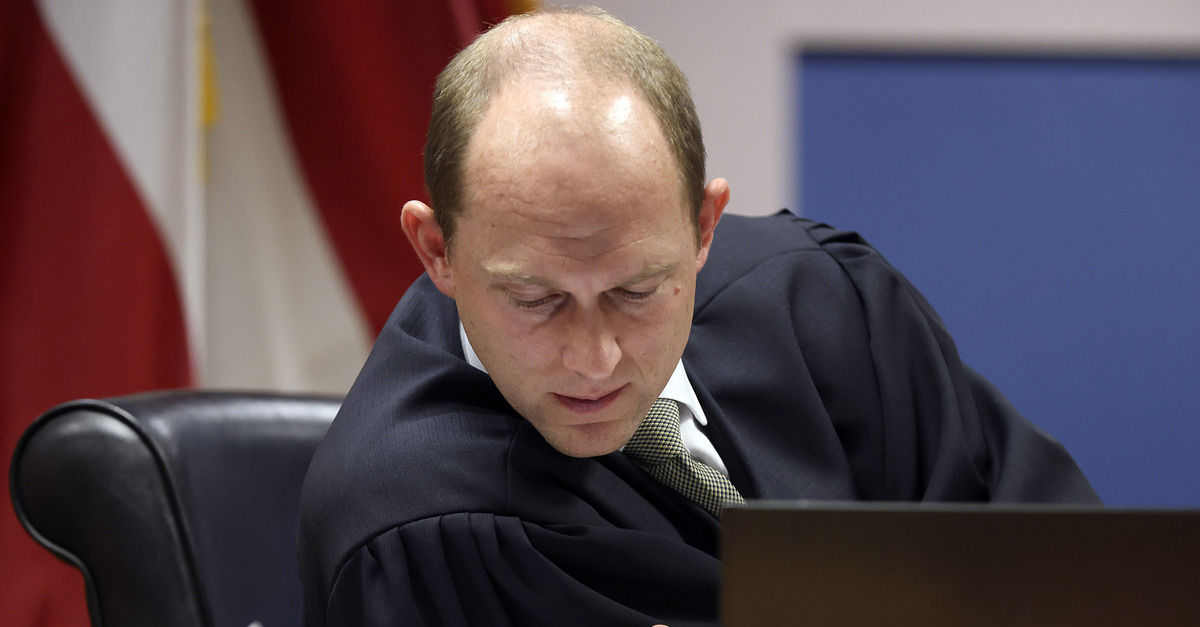
Fulton County Superior Judge Scott McAfee reads over Georgia law code during a hearing on the Georgia election interference case, Friday, Feb. 16, 2024, in Atlanta. (Alyssa Pointer/Pool Photo via AP)
The court previously committed to a private review of privilege claims with Bradley and his counsel directly. That in-camera review will be aided by case law suggesting the privilege can be “pierced” if attorney-client discussions could reveal ongoing perjury or fraud.
The state’s own self-inflicted wounds will also now factor into the court’s consideration of privilege issues and Bradley is now likely to return to the stand early next week for extended redirect from Sadow at the very least, McAfee ruled, pending the in-camera inquiry.
The judge put a point on it: “Mr. Bradley previously testified that the reason he left the firm was totally and completely covered by privilege. When asked by the state, he went into a factual scenario, that, to my mind, I don’t see how it related to privilege at all. And, so, now I’m left wondering if Mr. Bradley has been properly interpreting privilege this entire time.”
Have a tip we should know? [email protected]
